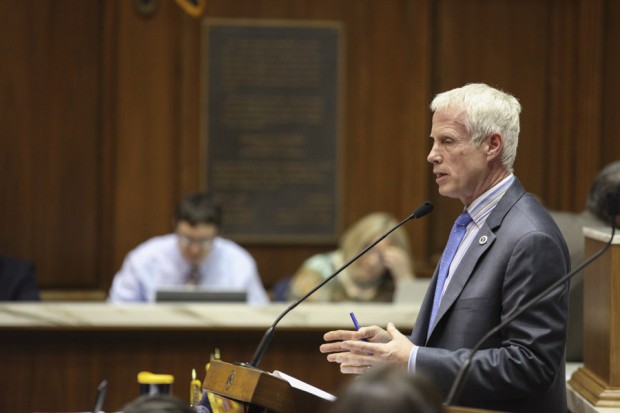Study of Indiana Voucher Program Empowers Advocates, Opponents

Rep. Bob Behning, R-Indianapolis, has been chair of the House Education Committee since 2011 when the General Assembly passed the law to create the private school voucher system. (Credit: General Assembly)
Results from the first-ever study of Indiana’s school voucher system found negative academic effects among low-income students in math, but also showed the same students could match or outperform public school peers in English – if they remained in the private school long enough.
The data set off a wave of response in the state and nation. Critics and champions of the controversial program used the results to back their notions of whether private school vouchers benefit students who leave public schools.
Read the study: Impact of the Indiana Choice Scholarship Program
Now, some are re-asserting call for a review over of the program’s expense and academic success. Others herald the data as proof of positive academic growth yet insist it’s only one piece to assessing the program.
Researchers Mark Berends of the University of Notre Dame and R. Joseph Waddington of the University of Kentucky found that students who remained in private school for four years improved to match or outperform public school students in English. But for math, the study found, students lost ground academically in the first two years in a private school before just catching up to their level of academic growth before using a voucher.
The study analyzed ISTEP scores of around 3,300 low-income students who left public schools for private ones during the first four years of the Choice Scholarship program, starting in the 2011-12 academic year. The study did not look at voucher students who never attended a public school – those students make up the majority of the program.
Rep. Robert Behning (R-Indianapolis), the law’s architect, says the data points to a need for addressing students’ first years transitioning from public to private school.
But overall, Behning says, the study shows vouchers are helping students.
“There is no question,” he says “Over time, you will see improvement. The trend line in this report shows very positive movement.”
Behning says he and other advocates did not promise “overnight” academic improvements when legislation created the program in 2011.
“But I think if you’re opposed to something, you are immediately going to start pointing fingers if you don’t see what you want,” he says. “But no question, [the study] is reflective of the reality that it is going to take a couple years to have an impact.”
Indiana State Teachers Association President Teresa Meredith is one of the opponents. In 2011 the association filed a legal suit, claiming the voucher program was unconstitutional. But the Indian Supreme Court ruled unanimously that public funds could be used to cover private school tuition.
Meredith says the study backs up anecdotal reports she’s heard about students struggling in math when the return to a public school after using the voucher program.
“They were sold to the taxpayer on the notion of helping the kids in the most challenged schools,” she says about vouchers. “And we know that is not really happening now.”
Meredith wants Gov. Eric Holcomb to approve an analysis of the financial accountability of the program.
The 2011 law that created the program was intended to offer a small number of the state’s low-income children who attended public schools an option to afford a private religious school. But the Choice Scholarship program has since become the largest in the country by allowing middle-class families who never attended a public school to be eligible.
Today more than 34,000 students, or 3 percent of students statewide, are enrolled in the program at a cost of $146 million.
Results of the Indiana study are garnering national attention because President Trump and Education Secretary Betsy DeVos want to more states to embrace private school choice.
Robert Enlow, the president and CEO of school choice advocacy group EdChoice, says the upward-trending test scores are “good news” for students in the program but that ISTEP scores are not some of the top issues parents care about when picking schools.
A decline in ISTEP math scores was one of the most significant academic losses found in the report.
“Rather, parents tend to focus more on class sizes; academic quality; values and character instruction; school safety; and outcomes such as graduation rates and college acceptance,” he says in a statement.
Rep. Terri J. Austin (D-Anderson) says the study raises questions about the effectiveness of the Choice Scholarship Program and is another reason why a review of the program is needed.
“We need to help people understand what some of these policies are actually producing,” she says.”
But Austin wants the state to take a holistic approach to reviewing student academics and school performance. Politics and education policy have fractured how accountability works for traditional public schools, charter schools, and private schools, she says.
“This is about making sure our students are given the best opportunities to advance academically. And if there are lessons to be learned from the schools that participate in the voucher program we should be sharing those,” she says. “If there is some caution that you know we’re starting to see some trend, we should be addressing them.”
State Superintendent Jennifer McCormick previously called for a review of the voucher program in an interview with NPR. Her office declined Monday to comment until the study is peer-reviewed and published later this year.